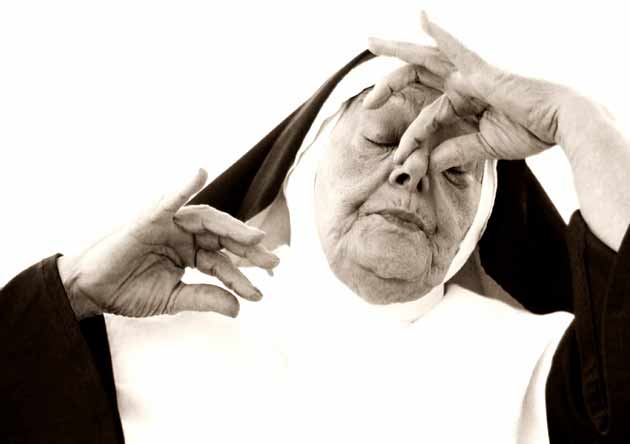
TonyRoma’s promotes his ‘World Famous Ribs’. Is that like saying that apples are world-famous because everyone knows about apples, and as such, apples are famous around the world? And so here, are we simply being reminded that ribs are world famous? Or is Tony saying that his servings of ribs are world famous? If so, what benefit is it for the consumer to eat something that is world-famous. Does it taste better? Or is it so delicious that people are raving about it all over the world? I had never heard nor set foot at TonyRoma’s. I must have walked past an outlet, if I had taken this photo. I had the impression that it was just a corner pub. While writing this blog, I searched and discovered that this chain started in 1972 and now has 200 restaurants in 32 countries. Well… I never!
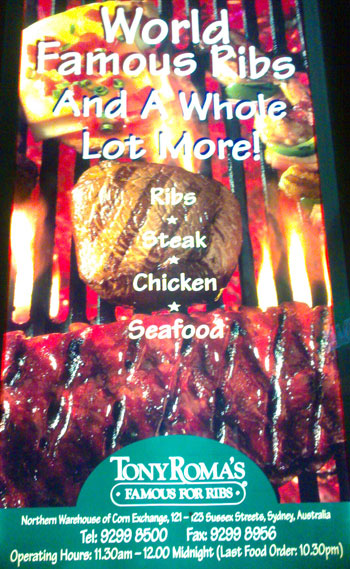 If we were to go to three major cities, like Singapore, Paris, and London, and ask random strangers if they can name a great restaurant that serves ribs, would the strangers scratch their head, look heavenward, and snap their fingers while exclaiming, ‘Oh yes, and you can’t beat TonyRoma’s!’ Perhaps so, but is this chain world famous, or is it simply an international business? My books are in many countries, but I am not sure that I am world famous. I have fans around the globe, but does that make me world famous? This article is simply asking about why someone needs to tell me that they are world famous, and what that revelation does for a consumer. If the ribs are delicious, then why would the consumer care whether or not people in Aruba think highly of it? Now that I know more about this chain, I shall give it a go. Maybe I’ll change my tune when I experience the taste. Dare I admit to you that I have never ordered ribs? The idea has never appealed to me. There’s always a first time.
If we were to go to three major cities, like Singapore, Paris, and London, and ask random strangers if they can name a great restaurant that serves ribs, would the strangers scratch their head, look heavenward, and snap their fingers while exclaiming, ‘Oh yes, and you can’t beat TonyRoma’s!’ Perhaps so, but is this chain world famous, or is it simply an international business? My books are in many countries, but I am not sure that I am world famous. I have fans around the globe, but does that make me world famous? This article is simply asking about why someone needs to tell me that they are world famous, and what that revelation does for a consumer. If the ribs are delicious, then why would the consumer care whether or not people in Aruba think highly of it? Now that I know more about this chain, I shall give it a go. Maybe I’ll change my tune when I experience the taste. Dare I admit to you that I have never ordered ribs? The idea has never appealed to me. There’s always a first time.
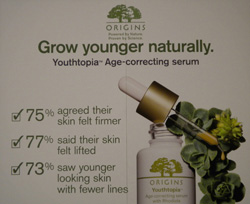 This massive wall-sized poster at a department store says that we can grow younger naturally. To stress the point, they say that 77% of people who used the product thought that their skin felt lifted. Was their skin lifted, or did it just ‘feel’ lifted? I have no reason to bag this product. It might well be a wonderful cream. I am simply questioning why (on a massive wall) they make statements that drive me to drink. I need to know more information, like how many times did they conduct the experiment? For example, did they ask people to use their product, and at the end, only 30% agreed, so they scrapped that group and started again and again and again until they found a vibrant bunch of women who happened to agree. But to what did they agree? What was the question? How long had they used the product? Where were they, during the time when they were using the product? Were they using other products as well, or did the group drink lots of apple juice at the same time? The combination of activities could have affected the outcome.
This massive wall-sized poster at a department store says that we can grow younger naturally. To stress the point, they say that 77% of people who used the product thought that their skin felt lifted. Was their skin lifted, or did it just ‘feel’ lifted? I have no reason to bag this product. It might well be a wonderful cream. I am simply questioning why (on a massive wall) they make statements that drive me to drink. I need to know more information, like how many times did they conduct the experiment? For example, did they ask people to use their product, and at the end, only 30% agreed, so they scrapped that group and started again and again and again until they found a vibrant bunch of women who happened to agree. But to what did they agree? What was the question? How long had they used the product? Where were they, during the time when they were using the product? Were they using other products as well, or did the group drink lots of apple juice at the same time? The combination of activities could have affected the outcome.
 Did the company take these women to a holiday resort and pamper them for four weeks with excellent food, rest, and exercise, as well as daily facials; thereby rejuvenating the group to such a degree that all the women felt better? I ask these questions because the fine print intrigued me. It said, ‘Based on a four week sensory study of 52 women in the US.’ Maybe those in-the-know would know, but what is a ‘sensory study’ to an average person walking through the department store?
Did the company take these women to a holiday resort and pamper them for four weeks with excellent food, rest, and exercise, as well as daily facials; thereby rejuvenating the group to such a degree that all the women felt better? I ask these questions because the fine print intrigued me. It said, ‘Based on a four week sensory study of 52 women in the US.’ Maybe those in-the-know would know, but what is a ‘sensory study’ to an average person walking through the department store?
At the time of snapping this photo (May 2009), there were over 307 million people in the USA. More than half were female. 80% were over 15 years of age (the age at which girls start to use beauty products), so that means that there could have been over 120 million women within the target market. Of the 120 million, the company selected 52. Is that a good scientific balance? Is 52 out of 120 million a satisfactory sample to warrant such claims? I really do not know. I am not mocking these figures. This might well be the world standard when it comes to beauty products. I have no idea. I simply do not like the notion that 52 people’s responses (about unexplained methodologies) warrant such claims.
Far too many questions remain unanswered. I visited the company’s website and could not find anything that discusses the methodologies. I will stress again that I do not doubt the quality of the products. I had not used them. But I am wondering how people can make such claims.
Back in September of 1950, on NBC, Palmolive aired a television commercial of a woman who seemed dull and dreary. A man appeared in her living room and recommended Palmolive soap. ‘If used three times per day over two weeks, lathered into the face for one minute each time, the woman was promised ‘a lovelier complexion’. A few seconds later, she emerges looking like a glamour queen. The announcer said, ‘Scientific tests on 1285 women, supervised by 36 leading skin specialists, shows that Palmolive brings most women a lovelier complexion.’
In 1950, there were approximately 55 million women over the age of 15. A sample of 1285 in 55,000,000 is much better than 52 in 120,000,000.
Palmolive engaged 36 leading experts. This company’s site makes no mention of experts in relation to this product.
I guess it all depends on the scientific definition of the terms ‘lovely’ (not to mention ‘lovelier’). And as for the difference between skin ‘feeling’ firm or ‘being’ firm, that’s one long argument.
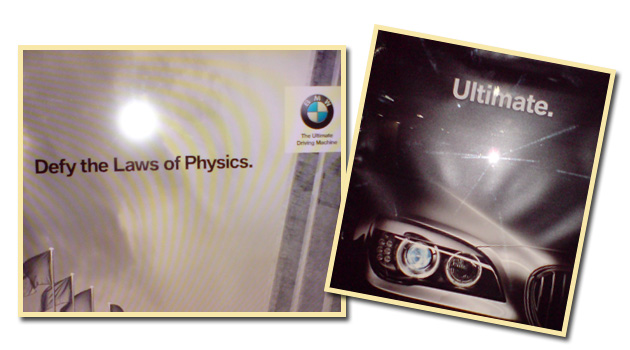
It seems that BMW can ‘Defy the Laws of Physics’ (I do not understand the capital letters). Indeed, such a discovery would warrant more than a billboard at an airport. It’s a wonder their engineers haven’t been kidnapped by aliens or a secret government agency. Defying physics must be the next frontier. Alas, it’s available to all who can afford the ‘Ultimate Driving Machine’. In any case, the engineers at BMW will need to find a new job. They have finally designed the ‘Ultimate.’ Nothing can come thereafter. According to Dictionary.com, the adjective means, ‘last; furthest or farthest; ending a process or series…’
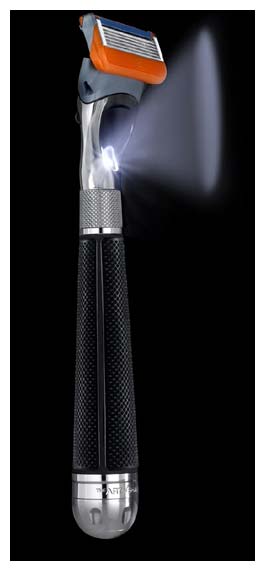 I ought to be proud to live in an era where one can walk through a supermarket and access the ultimate in razors, detergents, and household products. These poor manufacturers will have nothing to do, now that they have reached the end of the design cycle. What can be better than the best? I guess they can always add one more blade to my five-blade vibrating front-lit night-vision razor. Why not go where no human has been before: the 12-blade razor. I am not sure which would be harder: to eventually merge all twelve blades into one laser-sharp turbo blade; or to come up with a word than dares to surpass ‘ultimate’. Oh, it might be called, the ‘All-new 12-in-one complete shaving system: where you only need to shave once per month.’ By the way, Google the word ‘ultimate’ and more than 307 million links are returned. The word ‘best’ brings over 2.49 billion links. The word ‘most’ follows at 2.44 billion.
I ought to be proud to live in an era where one can walk through a supermarket and access the ultimate in razors, detergents, and household products. These poor manufacturers will have nothing to do, now that they have reached the end of the design cycle. What can be better than the best? I guess they can always add one more blade to my five-blade vibrating front-lit night-vision razor. Why not go where no human has been before: the 12-blade razor. I am not sure which would be harder: to eventually merge all twelve blades into one laser-sharp turbo blade; or to come up with a word than dares to surpass ‘ultimate’. Oh, it might be called, the ‘All-new 12-in-one complete shaving system: where you only need to shave once per month.’ By the way, Google the word ‘ultimate’ and more than 307 million links are returned. The word ‘best’ brings over 2.49 billion links. The word ‘most’ follows at 2.44 billion.
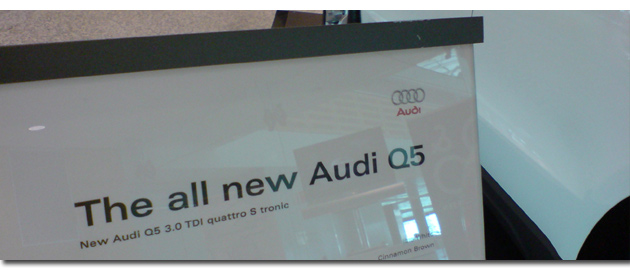 Companies speak about building something from the ground-up. And they boast about it being ‘all new’. This puzzles me. How new does it make it? What is encompassed within the word ‘all’? Are we to assume that everything within this Audi is new? Does ‘all’ mean ‘everything’? So we have new nuts and bolts that had hitherto never been used on any other Audi? Not a single item within the engine or body had existed previously? If that’s the case, I take my hat off to the company. Wow. Fancy designing something as complex as a motor car, with tens of thousands of parts, where each part had to be designed from scratch. That would be exhausting. They must have a pretty nifty network of suppliers. I find it a challenge to find one competent printer who can put ink on paper. And here they are commissioning factories left right and center. Talk about just-in-time management! The feature that curls my whiskers is the ‘tronic’ aspect of this car. Not only do you get tronic, you can enjoy the S tronic. Now that’s edging closer to the ultimate driving experience… but there’s no need. BMW has beaten them to it.
Companies speak about building something from the ground-up. And they boast about it being ‘all new’. This puzzles me. How new does it make it? What is encompassed within the word ‘all’? Are we to assume that everything within this Audi is new? Does ‘all’ mean ‘everything’? So we have new nuts and bolts that had hitherto never been used on any other Audi? Not a single item within the engine or body had existed previously? If that’s the case, I take my hat off to the company. Wow. Fancy designing something as complex as a motor car, with tens of thousands of parts, where each part had to be designed from scratch. That would be exhausting. They must have a pretty nifty network of suppliers. I find it a challenge to find one competent printer who can put ink on paper. And here they are commissioning factories left right and center. Talk about just-in-time management! The feature that curls my whiskers is the ‘tronic’ aspect of this car. Not only do you get tronic, you can enjoy the S tronic. Now that’s edging closer to the ultimate driving experience… but there’s no need. BMW has beaten them to it.
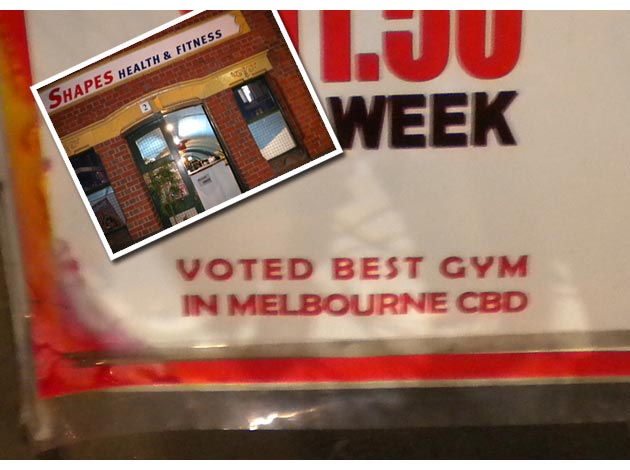 Before I go, can someone tell me who does all the voting? I get around a fair bit, and I buy heaps of products, and use all sorts of services, yet I have never been asked to vote. Who gets selected? Who voted this as the best gym in Melbourne? Correction: only the best in the CBD! It might well be true, but who voted? Did they frequent every gym for three months at a time, and having completed their examinations, concluded, independently and individually, that this gym was the best? How? Who? What? On what basis? I never know what to think when a fast-food joint assures me that their meat pies were voted the best.
Before I go, can someone tell me who does all the voting? I get around a fair bit, and I buy heaps of products, and use all sorts of services, yet I have never been asked to vote. Who gets selected? Who voted this as the best gym in Melbourne? Correction: only the best in the CBD! It might well be true, but who voted? Did they frequent every gym for three months at a time, and having completed their examinations, concluded, independently and individually, that this gym was the best? How? Who? What? On what basis? I never know what to think when a fast-food joint assures me that their meat pies were voted the best.
Airlines take my breath away when their in-flight magazine’s front cover says something like, ‘Voted the best in-flight magazine in the world’. How, who, on what bases, but most of all… by whom? If by the travellers, one would assume that each passenger would have subscribed to every such publication and read all of them for the whole year, and in the end, voted for the best (but on what basis — the crossword puzzle?). I cannot understand how consumers can vote an airline-lounge to be the best in the world? How many frequent flyers have frequented so many lounges? So exhausting… does anyone know of a good hotel?



Comments are closed.